City Sky and Emma's Tax Implications: GST and Capital Gains Tax
VerifiedAdded on 2021/02/21
|9
|2778
|38
Project
AI Summary
This individual project analyzes the Goods and Services Tax (GST) and capital gains tax (CGT) implications for two scenarios. The first case involves City Sky, a property investment and development company, seeking to claim input tax credits for legal services related to apartment construction. The analysis determines the eligibility of these credits based on Australian GST laws, considering factors like business registration and the nature of the services. The second case examines Emma's tax return, focusing on CGT implications from the sale of land, shares, and a stamp collection. The project calculates capital gains and losses, considering acquisition costs, expenses, and relevant tax regulations, including exemptions for assets acquired before specific dates. The project applies Australian taxation guidelines to determine tax liabilities and deductions for each transaction, providing a comprehensive overview of CGT calculations and implications.

INDIVIDUAL PROJECT
1
1
Paraphrase This Document
Need a fresh take? Get an instant paraphrase of this document with our AI Paraphraser
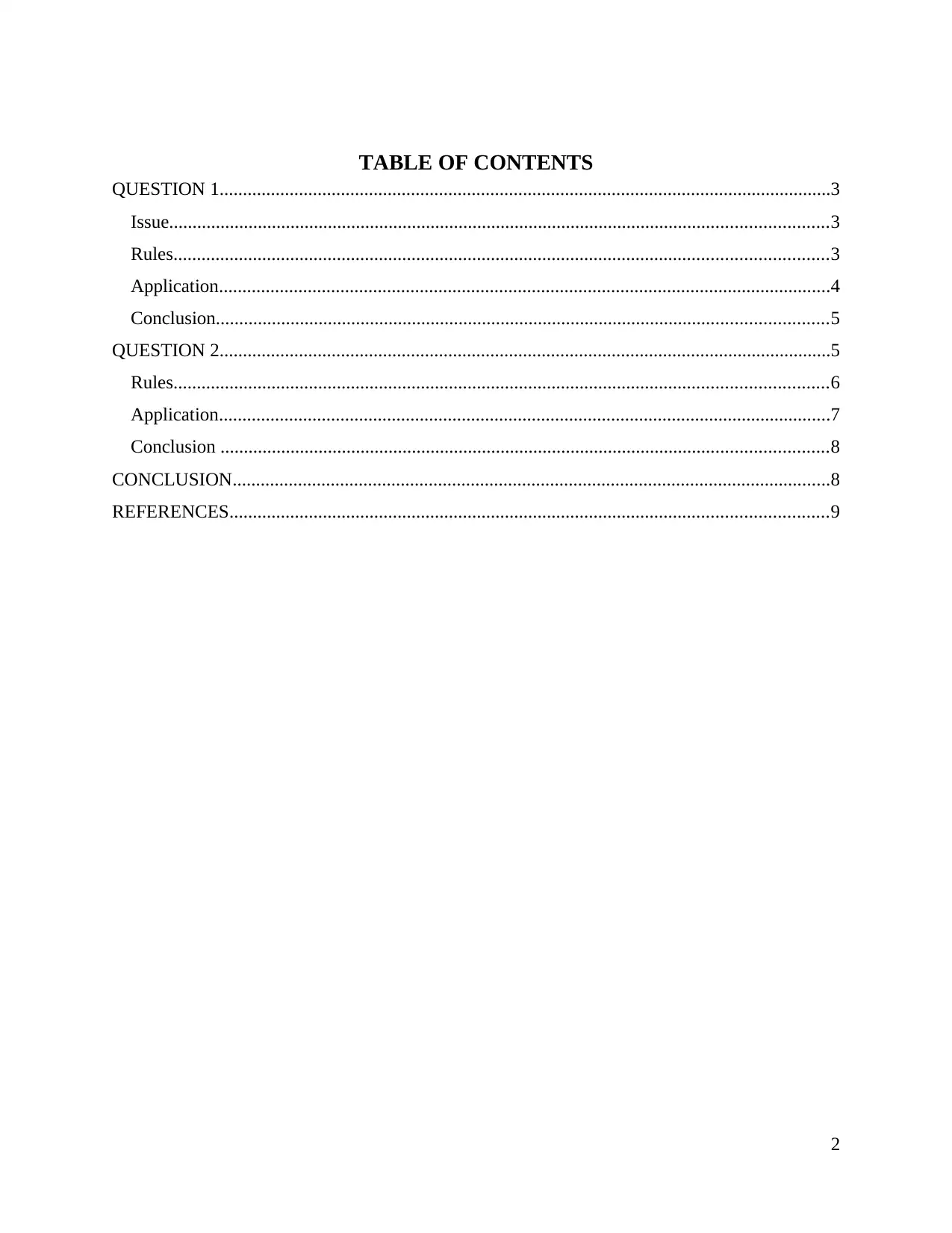
TABLE OF CONTENTS
QUESTION 1...................................................................................................................................3
Issue.............................................................................................................................................3
Rules............................................................................................................................................3
Application...................................................................................................................................4
Conclusion...................................................................................................................................5
QUESTION 2...................................................................................................................................5
Rules............................................................................................................................................6
Application...................................................................................................................................7
Conclusion ..................................................................................................................................8
CONCLUSION................................................................................................................................8
REFERENCES................................................................................................................................9
2
QUESTION 1...................................................................................................................................3
Issue.............................................................................................................................................3
Rules............................................................................................................................................3
Application...................................................................................................................................4
Conclusion...................................................................................................................................5
QUESTION 2...................................................................................................................................5
Rules............................................................................................................................................6
Application...................................................................................................................................7
Conclusion ..................................................................................................................................8
CONCLUSION................................................................................................................................8
REFERENCES................................................................................................................................9
2
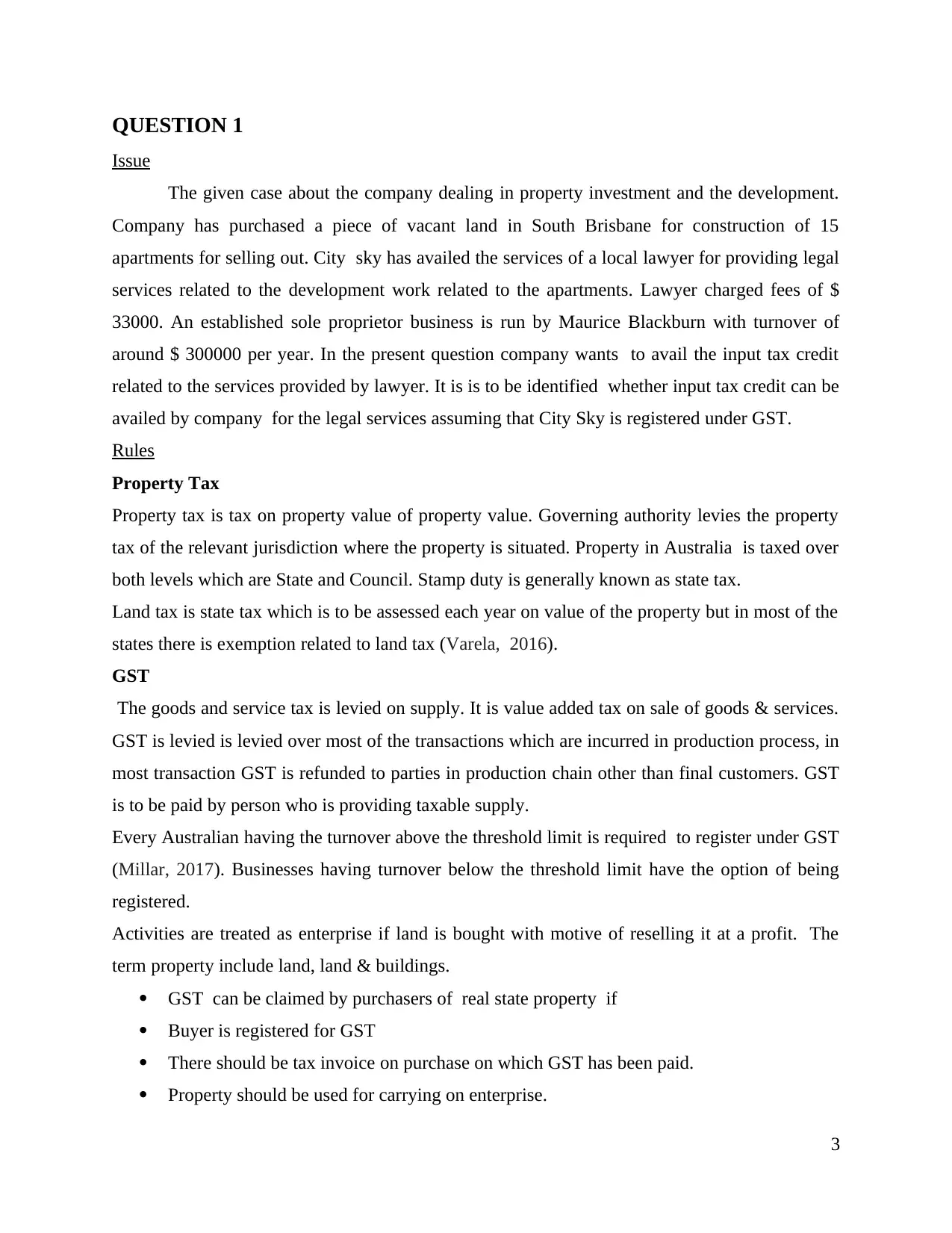
QUESTION 1
Issue
The given case about the company dealing in property investment and the development.
Company has purchased a piece of vacant land in South Brisbane for construction of 15
apartments for selling out. City sky has availed the services of a local lawyer for providing legal
services related to the development work related to the apartments. Lawyer charged fees of $
33000. An established sole proprietor business is run by Maurice Blackburn with turnover of
around $ 300000 per year. In the present question company wants to avail the input tax credit
related to the services provided by lawyer. It is is to be identified whether input tax credit can be
availed by company for the legal services assuming that City Sky is registered under GST.
Rules
Property Tax
Property tax is tax on property value of property value. Governing authority levies the property
tax of the relevant jurisdiction where the property is situated. Property in Australia is taxed over
both levels which are State and Council. Stamp duty is generally known as state tax.
Land tax is state tax which is to be assessed each year on value of the property but in most of the
states there is exemption related to land tax (Varela, 2016).
GST
The goods and service tax is levied on supply. It is value added tax on sale of goods & services.
GST is levied is levied over most of the transactions which are incurred in production process, in
most transaction GST is refunded to parties in production chain other than final customers. GST
is to be paid by person who is providing taxable supply.
Every Australian having the turnover above the threshold limit is required to register under GST
(Millar, 2017). Businesses having turnover below the threshold limit have the option of being
registered.
Activities are treated as enterprise if land is bought with motive of reselling it at a profit. The
term property include land, land & buildings.
GST can be claimed by purchasers of real state property if
Buyer is registered for GST
There should be tax invoice on purchase on which GST has been paid.
Property should be used for carrying on enterprise.
3
Issue
The given case about the company dealing in property investment and the development.
Company has purchased a piece of vacant land in South Brisbane for construction of 15
apartments for selling out. City sky has availed the services of a local lawyer for providing legal
services related to the development work related to the apartments. Lawyer charged fees of $
33000. An established sole proprietor business is run by Maurice Blackburn with turnover of
around $ 300000 per year. In the present question company wants to avail the input tax credit
related to the services provided by lawyer. It is is to be identified whether input tax credit can be
availed by company for the legal services assuming that City Sky is registered under GST.
Rules
Property Tax
Property tax is tax on property value of property value. Governing authority levies the property
tax of the relevant jurisdiction where the property is situated. Property in Australia is taxed over
both levels which are State and Council. Stamp duty is generally known as state tax.
Land tax is state tax which is to be assessed each year on value of the property but in most of the
states there is exemption related to land tax (Varela, 2016).
GST
The goods and service tax is levied on supply. It is value added tax on sale of goods & services.
GST is levied is levied over most of the transactions which are incurred in production process, in
most transaction GST is refunded to parties in production chain other than final customers. GST
is to be paid by person who is providing taxable supply.
Every Australian having the turnover above the threshold limit is required to register under GST
(Millar, 2017). Businesses having turnover below the threshold limit have the option of being
registered.
Activities are treated as enterprise if land is bought with motive of reselling it at a profit. The
term property include land, land & buildings.
GST can be claimed by purchasers of real state property if
Buyer is registered for GST
There should be tax invoice on purchase on which GST has been paid.
Property should be used for carrying on enterprise.
3
⊘ This is a preview!⊘
Do you want full access?
Subscribe today to unlock all pages.

Trusted by 1+ million students worldwide
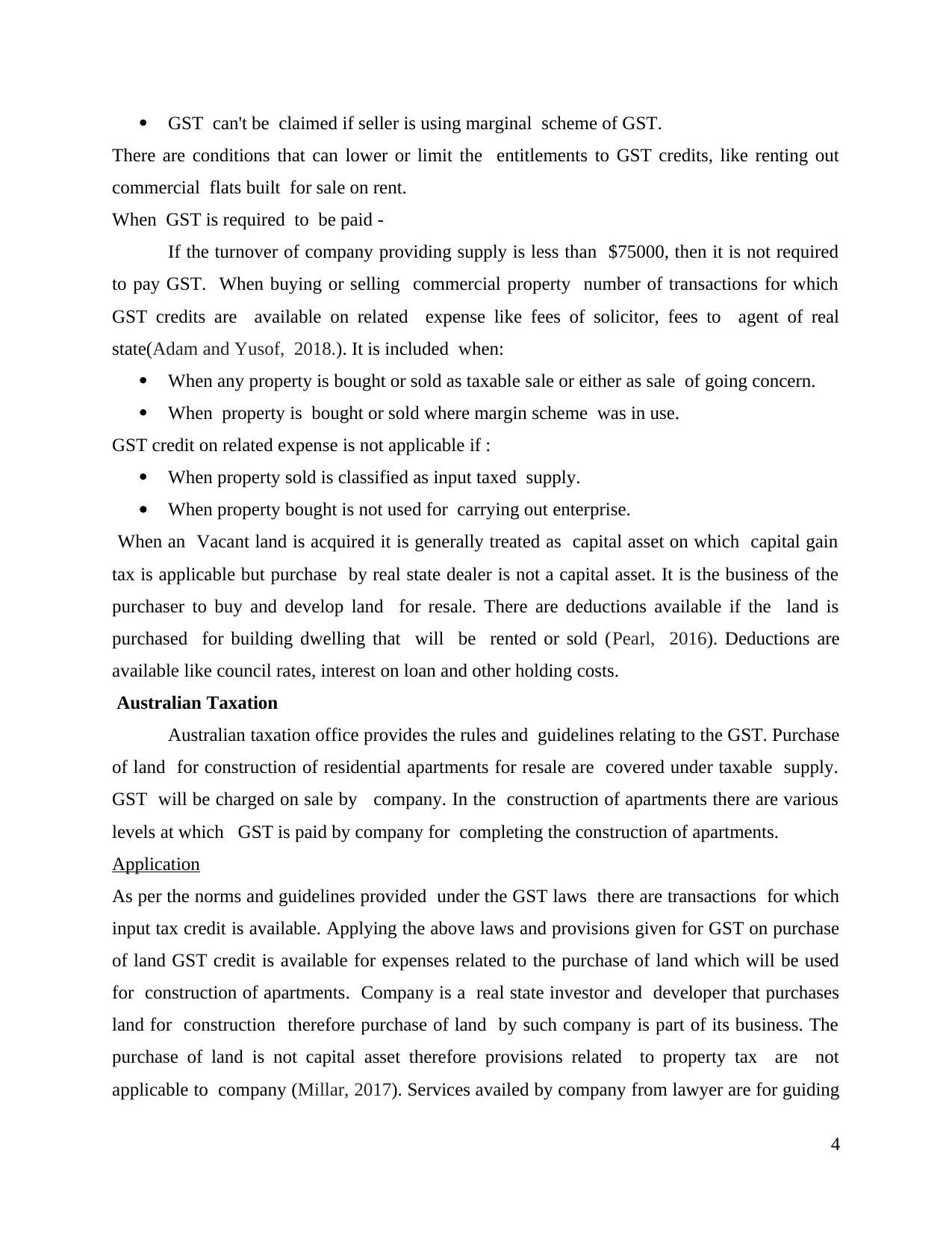
GST can't be claimed if seller is using marginal scheme of GST.
There are conditions that can lower or limit the entitlements to GST credits, like renting out
commercial flats built for sale on rent.
When GST is required to be paid -
If the turnover of company providing supply is less than $75000, then it is not required
to pay GST. When buying or selling commercial property number of transactions for which
GST credits are available on related expense like fees of solicitor, fees to agent of real
state(Adam and Yusof, 2018.). It is included when:
When any property is bought or sold as taxable sale or either as sale of going concern.
When property is bought or sold where margin scheme was in use.
GST credit on related expense is not applicable if :
When property sold is classified as input taxed supply.
When property bought is not used for carrying out enterprise.
When an Vacant land is acquired it is generally treated as capital asset on which capital gain
tax is applicable but purchase by real state dealer is not a capital asset. It is the business of the
purchaser to buy and develop land for resale. There are deductions available if the land is
purchased for building dwelling that will be rented or sold (Pearl, 2016). Deductions are
available like council rates, interest on loan and other holding costs.
Australian Taxation
Australian taxation office provides the rules and guidelines relating to the GST. Purchase
of land for construction of residential apartments for resale are covered under taxable supply.
GST will be charged on sale by company. In the construction of apartments there are various
levels at which GST is paid by company for completing the construction of apartments.
Application
As per the norms and guidelines provided under the GST laws there are transactions for which
input tax credit is available. Applying the above laws and provisions given for GST on purchase
of land GST credit is available for expenses related to the purchase of land which will be used
for construction of apartments. Company is a real state investor and developer that purchases
land for construction therefore purchase of land by such company is part of its business. The
purchase of land is not capital asset therefore provisions related to property tax are not
applicable to company (Millar, 2017). Services availed by company from lawyer are for guiding
4
There are conditions that can lower or limit the entitlements to GST credits, like renting out
commercial flats built for sale on rent.
When GST is required to be paid -
If the turnover of company providing supply is less than $75000, then it is not required
to pay GST. When buying or selling commercial property number of transactions for which
GST credits are available on related expense like fees of solicitor, fees to agent of real
state(Adam and Yusof, 2018.). It is included when:
When any property is bought or sold as taxable sale or either as sale of going concern.
When property is bought or sold where margin scheme was in use.
GST credit on related expense is not applicable if :
When property sold is classified as input taxed supply.
When property bought is not used for carrying out enterprise.
When an Vacant land is acquired it is generally treated as capital asset on which capital gain
tax is applicable but purchase by real state dealer is not a capital asset. It is the business of the
purchaser to buy and develop land for resale. There are deductions available if the land is
purchased for building dwelling that will be rented or sold (Pearl, 2016). Deductions are
available like council rates, interest on loan and other holding costs.
Australian Taxation
Australian taxation office provides the rules and guidelines relating to the GST. Purchase
of land for construction of residential apartments for resale are covered under taxable supply.
GST will be charged on sale by company. In the construction of apartments there are various
levels at which GST is paid by company for completing the construction of apartments.
Application
As per the norms and guidelines provided under the GST laws there are transactions for which
input tax credit is available. Applying the above laws and provisions given for GST on purchase
of land GST credit is available for expenses related to the purchase of land which will be used
for construction of apartments. Company is a real state investor and developer that purchases
land for construction therefore purchase of land by such company is part of its business. The
purchase of land is not capital asset therefore provisions related to property tax are not
applicable to company (Millar, 2017). Services availed by company from lawyer are for guiding
4
Paraphrase This Document
Need a fresh take? Get an instant paraphrase of this document with our AI Paraphraser
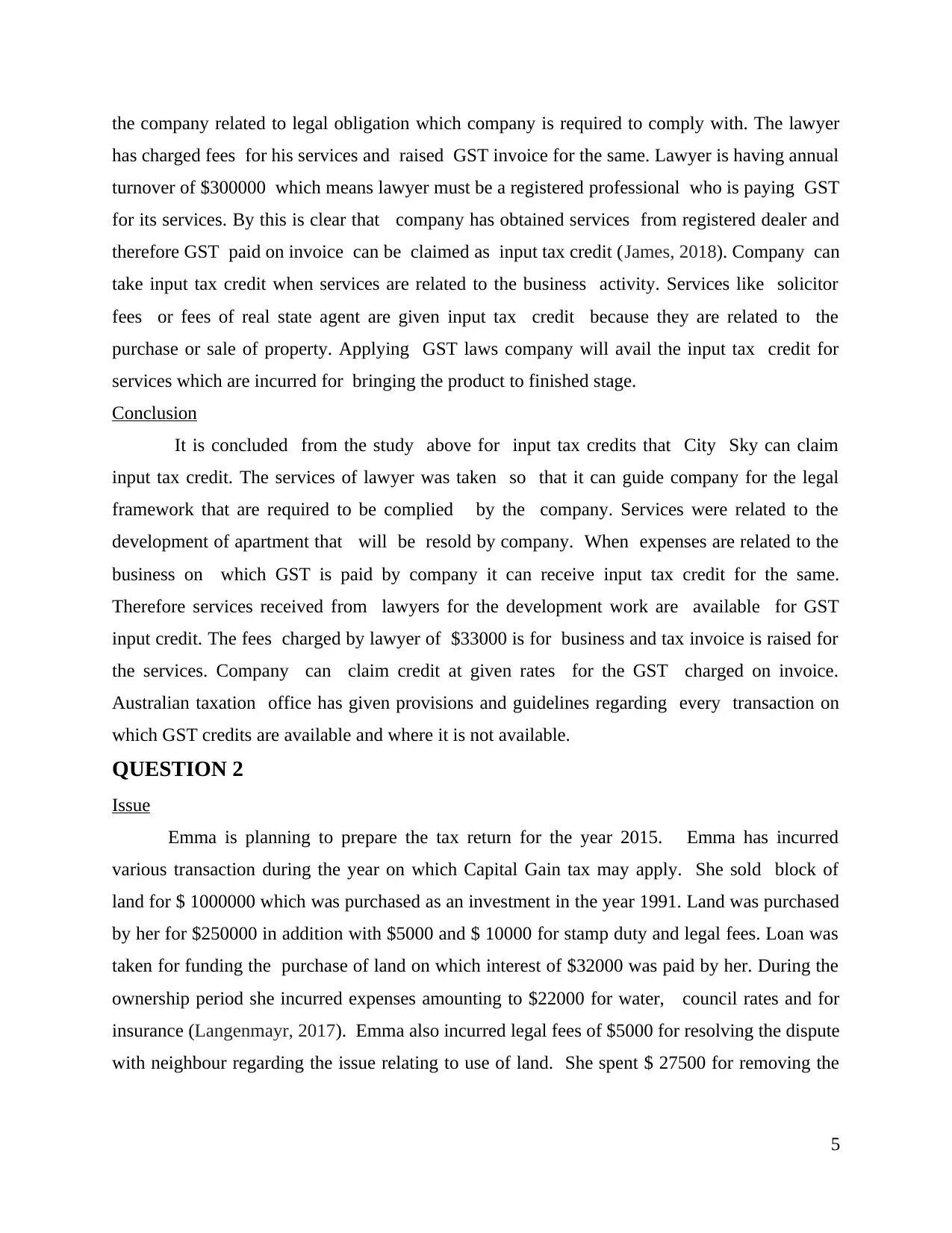
the company related to legal obligation which company is required to comply with. The lawyer
has charged fees for his services and raised GST invoice for the same. Lawyer is having annual
turnover of $300000 which means lawyer must be a registered professional who is paying GST
for its services. By this is clear that company has obtained services from registered dealer and
therefore GST paid on invoice can be claimed as input tax credit (James, 2018). Company can
take input tax credit when services are related to the business activity. Services like solicitor
fees or fees of real state agent are given input tax credit because they are related to the
purchase or sale of property. Applying GST laws company will avail the input tax credit for
services which are incurred for bringing the product to finished stage.
Conclusion
It is concluded from the study above for input tax credits that City Sky can claim
input tax credit. The services of lawyer was taken so that it can guide company for the legal
framework that are required to be complied by the company. Services were related to the
development of apartment that will be resold by company. When expenses are related to the
business on which GST is paid by company it can receive input tax credit for the same.
Therefore services received from lawyers for the development work are available for GST
input credit. The fees charged by lawyer of $33000 is for business and tax invoice is raised for
the services. Company can claim credit at given rates for the GST charged on invoice.
Australian taxation office has given provisions and guidelines regarding every transaction on
which GST credits are available and where it is not available.
QUESTION 2
Issue
Emma is planning to prepare the tax return for the year 2015. Emma has incurred
various transaction during the year on which Capital Gain tax may apply. She sold block of
land for $ 1000000 which was purchased as an investment in the year 1991. Land was purchased
by her for $250000 in addition with $5000 and $ 10000 for stamp duty and legal fees. Loan was
taken for funding the purchase of land on which interest of $32000 was paid by her. During the
ownership period she incurred expenses amounting to $22000 for water, council rates and for
insurance (Langenmayr, 2017). Emma also incurred legal fees of $5000 for resolving the dispute
with neighbour regarding the issue relating to use of land. She spent $ 27500 for removing the
5
has charged fees for his services and raised GST invoice for the same. Lawyer is having annual
turnover of $300000 which means lawyer must be a registered professional who is paying GST
for its services. By this is clear that company has obtained services from registered dealer and
therefore GST paid on invoice can be claimed as input tax credit (James, 2018). Company can
take input tax credit when services are related to the business activity. Services like solicitor
fees or fees of real state agent are given input tax credit because they are related to the
purchase or sale of property. Applying GST laws company will avail the input tax credit for
services which are incurred for bringing the product to finished stage.
Conclusion
It is concluded from the study above for input tax credits that City Sky can claim
input tax credit. The services of lawyer was taken so that it can guide company for the legal
framework that are required to be complied by the company. Services were related to the
development of apartment that will be resold by company. When expenses are related to the
business on which GST is paid by company it can receive input tax credit for the same.
Therefore services received from lawyers for the development work are available for GST
input credit. The fees charged by lawyer of $33000 is for business and tax invoice is raised for
the services. Company can claim credit at given rates for the GST charged on invoice.
Australian taxation office has given provisions and guidelines regarding every transaction on
which GST credits are available and where it is not available.
QUESTION 2
Issue
Emma is planning to prepare the tax return for the year 2015. Emma has incurred
various transaction during the year on which Capital Gain tax may apply. She sold block of
land for $ 1000000 which was purchased as an investment in the year 1991. Land was purchased
by her for $250000 in addition with $5000 and $ 10000 for stamp duty and legal fees. Loan was
taken for funding the purchase of land on which interest of $32000 was paid by her. During the
ownership period she incurred expenses amounting to $22000 for water, council rates and for
insurance (Langenmayr, 2017). Emma also incurred legal fees of $5000 for resolving the dispute
with neighbour regarding the issue relating to use of land. She spent $ 27500 for removing the
5
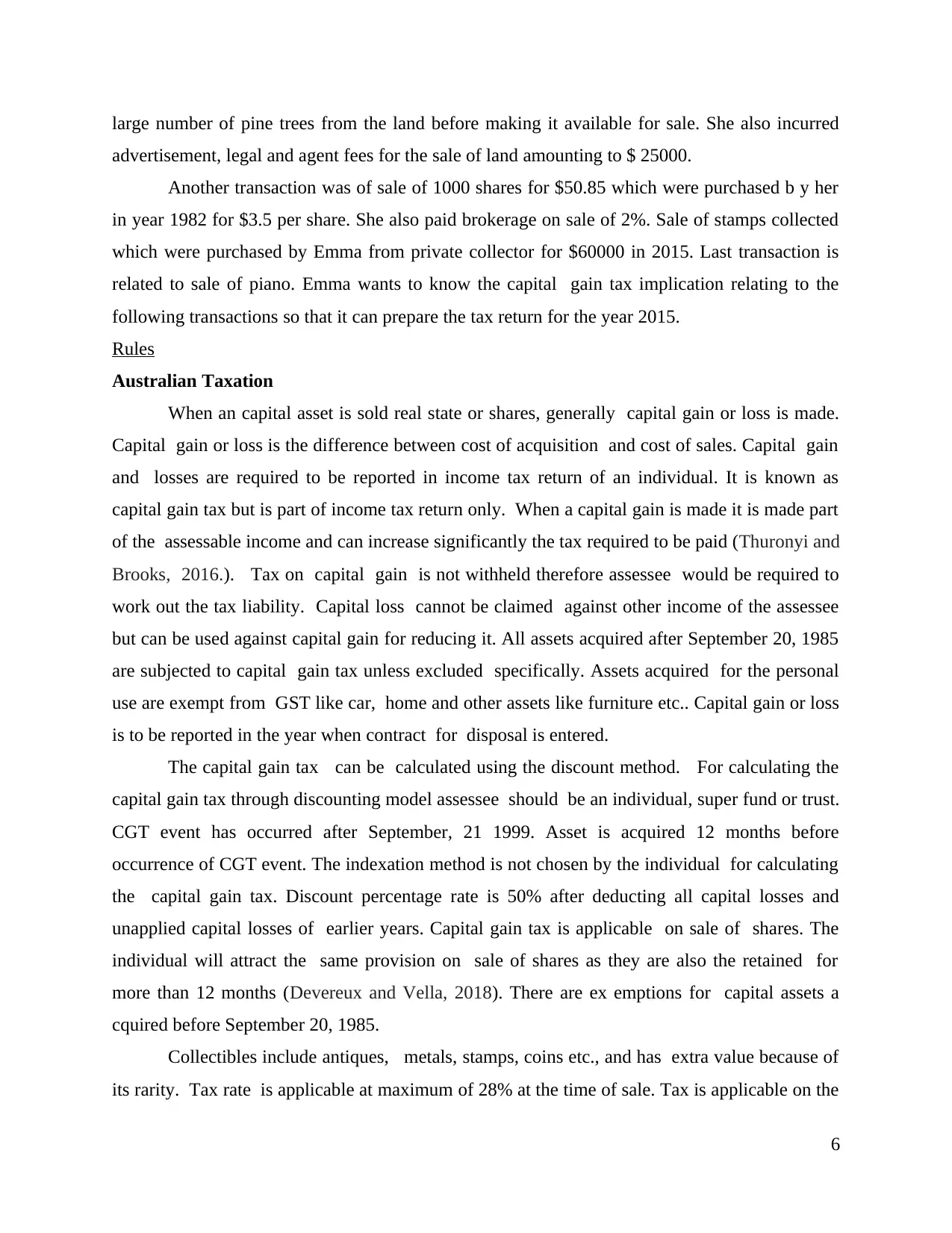
large number of pine trees from the land before making it available for sale. She also incurred
advertisement, legal and agent fees for the sale of land amounting to $ 25000.
Another transaction was of sale of 1000 shares for $50.85 which were purchased b y her
in year 1982 for $3.5 per share. She also paid brokerage on sale of 2%. Sale of stamps collected
which were purchased by Emma from private collector for $60000 in 2015. Last transaction is
related to sale of piano. Emma wants to know the capital gain tax implication relating to the
following transactions so that it can prepare the tax return for the year 2015.
Rules
Australian Taxation
When an capital asset is sold real state or shares, generally capital gain or loss is made.
Capital gain or loss is the difference between cost of acquisition and cost of sales. Capital gain
and losses are required to be reported in income tax return of an individual. It is known as
capital gain tax but is part of income tax return only. When a capital gain is made it is made part
of the assessable income and can increase significantly the tax required to be paid (Thuronyi and
Brooks, 2016.). Tax on capital gain is not withheld therefore assessee would be required to
work out the tax liability. Capital loss cannot be claimed against other income of the assessee
but can be used against capital gain for reducing it. All assets acquired after September 20, 1985
are subjected to capital gain tax unless excluded specifically. Assets acquired for the personal
use are exempt from GST like car, home and other assets like furniture etc.. Capital gain or loss
is to be reported in the year when contract for disposal is entered.
The capital gain tax can be calculated using the discount method. For calculating the
capital gain tax through discounting model assessee should be an individual, super fund or trust.
CGT event has occurred after September, 21 1999. Asset is acquired 12 months before
occurrence of CGT event. The indexation method is not chosen by the individual for calculating
the capital gain tax. Discount percentage rate is 50% after deducting all capital losses and
unapplied capital losses of earlier years. Capital gain tax is applicable on sale of shares. The
individual will attract the same provision on sale of shares as they are also the retained for
more than 12 months (Devereux and Vella, 2018). There are ex emptions for capital assets a
cquired before September 20, 1985.
Collectibles include antiques, metals, stamps, coins etc., and has extra value because of
its rarity. Tax rate is applicable at maximum of 28% at the time of sale. Tax is applicable on the
6
advertisement, legal and agent fees for the sale of land amounting to $ 25000.
Another transaction was of sale of 1000 shares for $50.85 which were purchased b y her
in year 1982 for $3.5 per share. She also paid brokerage on sale of 2%. Sale of stamps collected
which were purchased by Emma from private collector for $60000 in 2015. Last transaction is
related to sale of piano. Emma wants to know the capital gain tax implication relating to the
following transactions so that it can prepare the tax return for the year 2015.
Rules
Australian Taxation
When an capital asset is sold real state or shares, generally capital gain or loss is made.
Capital gain or loss is the difference between cost of acquisition and cost of sales. Capital gain
and losses are required to be reported in income tax return of an individual. It is known as
capital gain tax but is part of income tax return only. When a capital gain is made it is made part
of the assessable income and can increase significantly the tax required to be paid (Thuronyi and
Brooks, 2016.). Tax on capital gain is not withheld therefore assessee would be required to
work out the tax liability. Capital loss cannot be claimed against other income of the assessee
but can be used against capital gain for reducing it. All assets acquired after September 20, 1985
are subjected to capital gain tax unless excluded specifically. Assets acquired for the personal
use are exempt from GST like car, home and other assets like furniture etc.. Capital gain or loss
is to be reported in the year when contract for disposal is entered.
The capital gain tax can be calculated using the discount method. For calculating the
capital gain tax through discounting model assessee should be an individual, super fund or trust.
CGT event has occurred after September, 21 1999. Asset is acquired 12 months before
occurrence of CGT event. The indexation method is not chosen by the individual for calculating
the capital gain tax. Discount percentage rate is 50% after deducting all capital losses and
unapplied capital losses of earlier years. Capital gain tax is applicable on sale of shares. The
individual will attract the same provision on sale of shares as they are also the retained for
more than 12 months (Devereux and Vella, 2018). There are ex emptions for capital assets a
cquired before September 20, 1985.
Collectibles include antiques, metals, stamps, coins etc., and has extra value because of
its rarity. Tax rate is applicable at maximum of 28% at the time of sale. Tax is applicable on the
6
⊘ This is a preview!⊘
Do you want full access?
Subscribe today to unlock all pages.

Trusted by 1+ million students worldwide
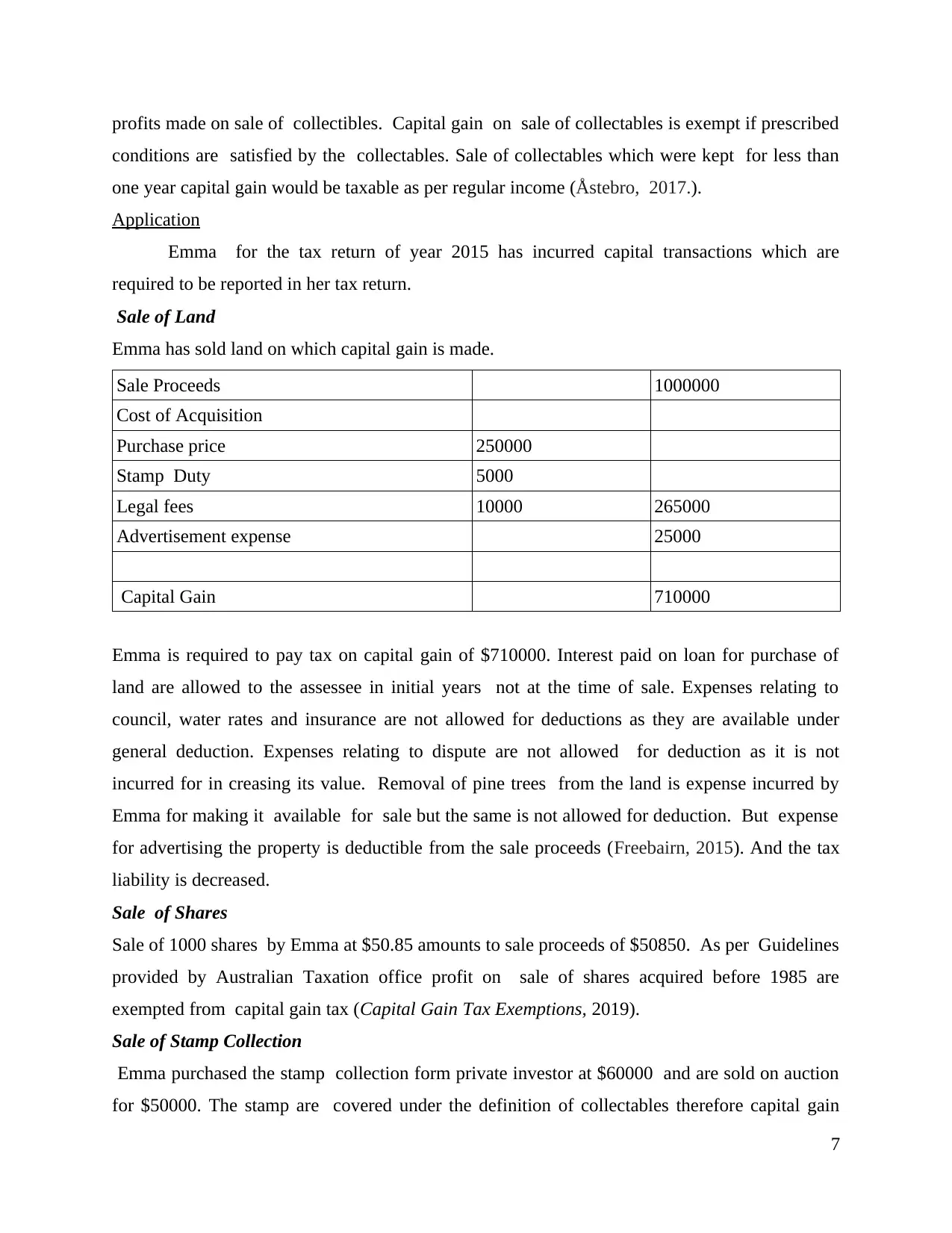
profits made on sale of collectibles. Capital gain on sale of collectables is exempt if prescribed
conditions are satisfied by the collectables. Sale of collectables which were kept for less than
one year capital gain would be taxable as per regular income (Åstebro, 2017.).
Application
Emma for the tax return of year 2015 has incurred capital transactions which are
required to be reported in her tax return.
Sale of Land
Emma has sold land on which capital gain is made.
Sale Proceeds 1000000
Cost of Acquisition
Purchase price 250000
Stamp Duty 5000
Legal fees 10000 265000
Advertisement expense 25000
Capital Gain 710000
Emma is required to pay tax on capital gain of $710000. Interest paid on loan for purchase of
land are allowed to the assessee in initial years not at the time of sale. Expenses relating to
council, water rates and insurance are not allowed for deductions as they are available under
general deduction. Expenses relating to dispute are not allowed for deduction as it is not
incurred for in creasing its value. Removal of pine trees from the land is expense incurred by
Emma for making it available for sale but the same is not allowed for deduction. But expense
for advertising the property is deductible from the sale proceeds (Freebairn, 2015). And the tax
liability is decreased.
Sale of Shares
Sale of 1000 shares by Emma at $50.85 amounts to sale proceeds of $50850. As per Guidelines
provided by Australian Taxation office profit on sale of shares acquired before 1985 are
exempted from capital gain tax (Capital Gain Tax Exemptions, 2019).
Sale of Stamp Collection
Emma purchased the stamp collection form private investor at $60000 and are sold on auction
for $50000. The stamp are covered under the definition of collectables therefore capital gain
7
conditions are satisfied by the collectables. Sale of collectables which were kept for less than
one year capital gain would be taxable as per regular income (Åstebro, 2017.).
Application
Emma for the tax return of year 2015 has incurred capital transactions which are
required to be reported in her tax return.
Sale of Land
Emma has sold land on which capital gain is made.
Sale Proceeds 1000000
Cost of Acquisition
Purchase price 250000
Stamp Duty 5000
Legal fees 10000 265000
Advertisement expense 25000
Capital Gain 710000
Emma is required to pay tax on capital gain of $710000. Interest paid on loan for purchase of
land are allowed to the assessee in initial years not at the time of sale. Expenses relating to
council, water rates and insurance are not allowed for deductions as they are available under
general deduction. Expenses relating to dispute are not allowed for deduction as it is not
incurred for in creasing its value. Removal of pine trees from the land is expense incurred by
Emma for making it available for sale but the same is not allowed for deduction. But expense
for advertising the property is deductible from the sale proceeds (Freebairn, 2015). And the tax
liability is decreased.
Sale of Shares
Sale of 1000 shares by Emma at $50.85 amounts to sale proceeds of $50850. As per Guidelines
provided by Australian Taxation office profit on sale of shares acquired before 1985 are
exempted from capital gain tax (Capital Gain Tax Exemptions, 2019).
Sale of Stamp Collection
Emma purchased the stamp collection form private investor at $60000 and are sold on auction
for $50000. The stamp are covered under the definition of collectables therefore capital gain
7
Paraphrase This Document
Need a fresh take? Get an instant paraphrase of this document with our AI Paraphraser
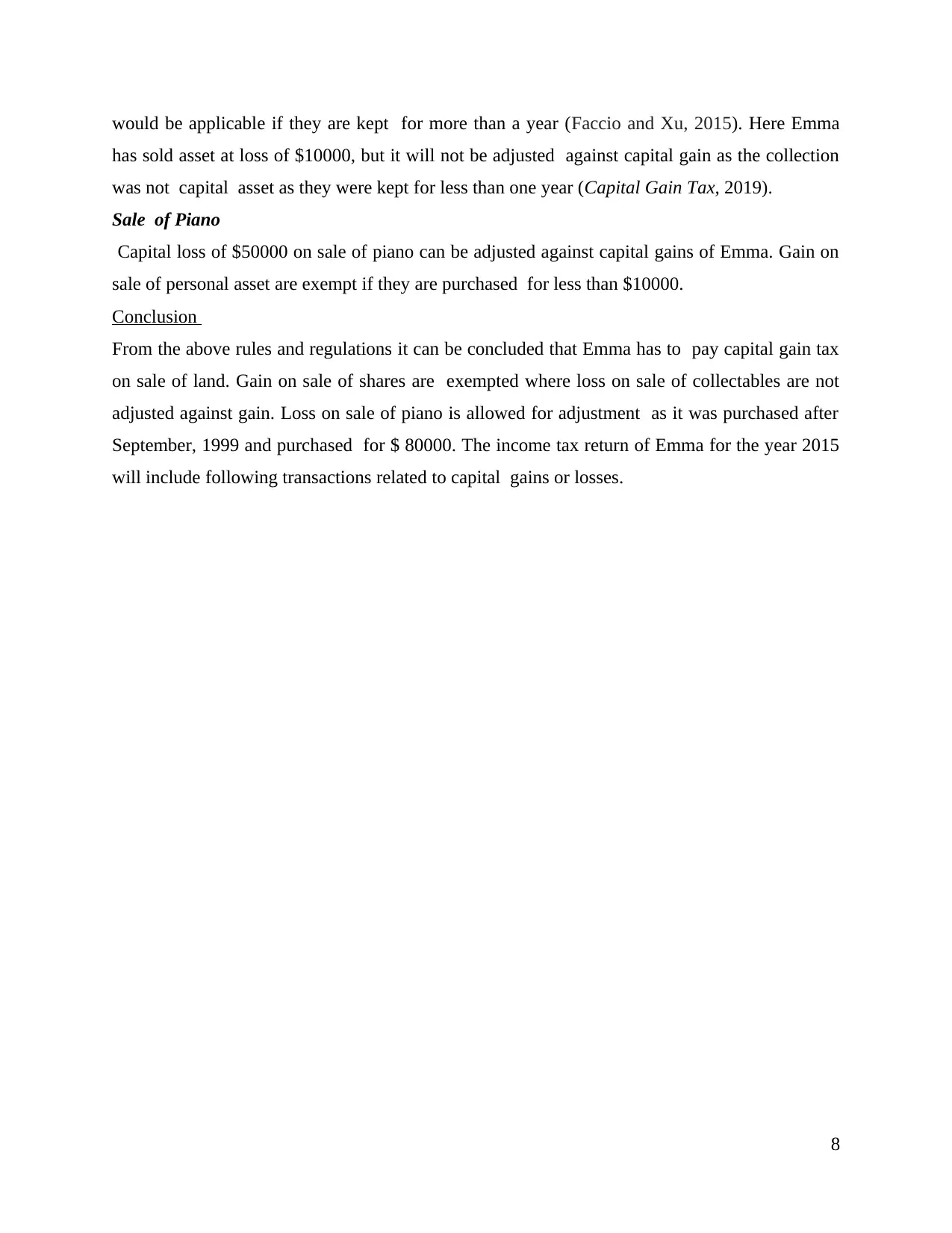
would be applicable if they are kept for more than a year (Faccio and Xu, 2015). Here Emma
has sold asset at loss of $10000, but it will not be adjusted against capital gain as the collection
was not capital asset as they were kept for less than one year (Capital Gain Tax, 2019).
Sale of Piano
Capital loss of $50000 on sale of piano can be adjusted against capital gains of Emma. Gain on
sale of personal asset are exempt if they are purchased for less than $10000.
Conclusion
From the above rules and regulations it can be concluded that Emma has to pay capital gain tax
on sale of land. Gain on sale of shares are exempted where loss on sale of collectables are not
adjusted against gain. Loss on sale of piano is allowed for adjustment as it was purchased after
September, 1999 and purchased for $ 80000. The income tax return of Emma for the year 2015
will include following transactions related to capital gains or losses.
8
has sold asset at loss of $10000, but it will not be adjusted against capital gain as the collection
was not capital asset as they were kept for less than one year (Capital Gain Tax, 2019).
Sale of Piano
Capital loss of $50000 on sale of piano can be adjusted against capital gains of Emma. Gain on
sale of personal asset are exempt if they are purchased for less than $10000.
Conclusion
From the above rules and regulations it can be concluded that Emma has to pay capital gain tax
on sale of land. Gain on sale of shares are exempted where loss on sale of collectables are not
adjusted against gain. Loss on sale of piano is allowed for adjustment as it was purchased after
September, 1999 and purchased for $ 80000. The income tax return of Emma for the year 2015
will include following transactions related to capital gains or losses.
8
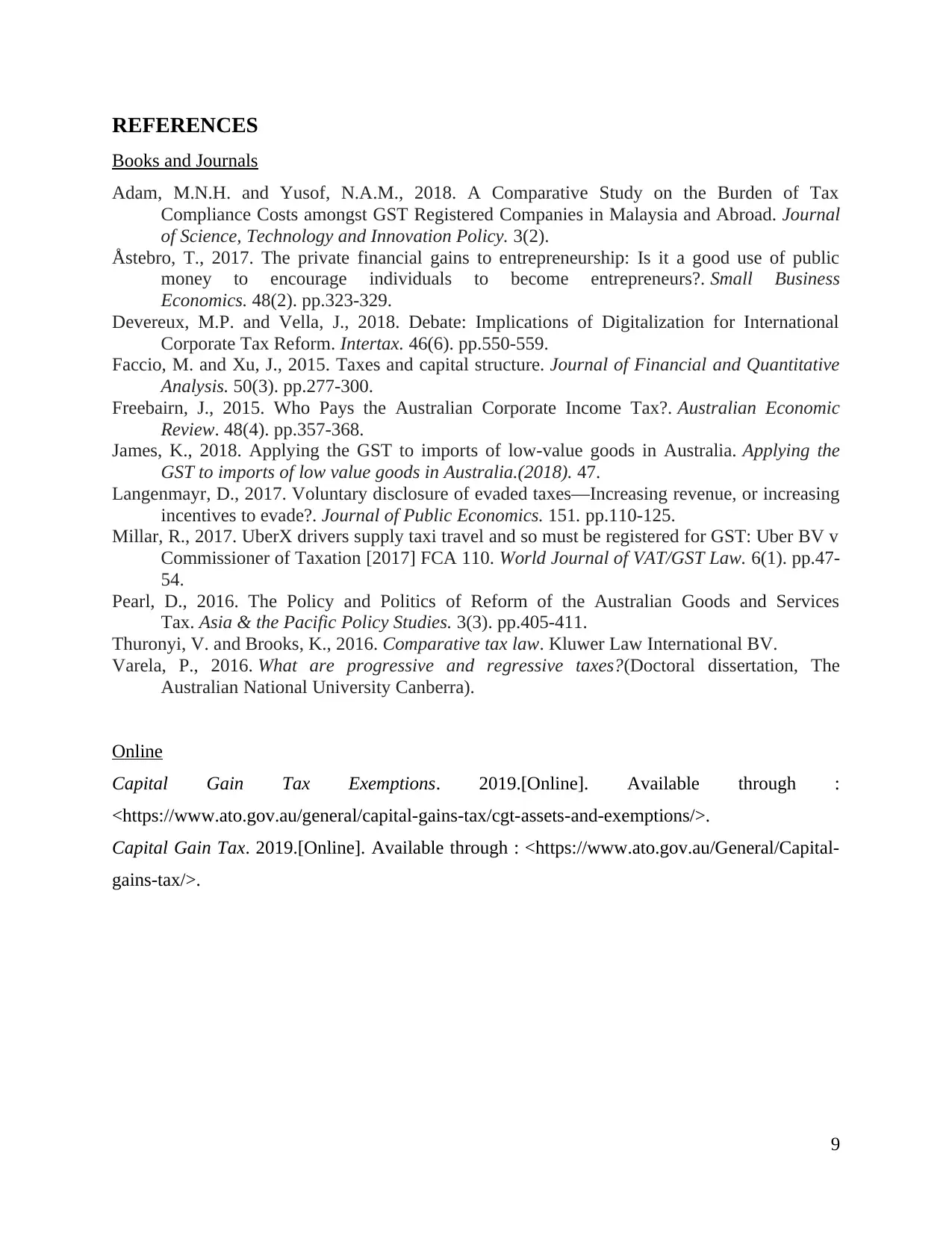
REFERENCES
Books and Journals
Adam, M.N.H. and Yusof, N.A.M., 2018. A Comparative Study on the Burden of Tax
Compliance Costs amongst GST Registered Companies in Malaysia and Abroad. Journal
of Science, Technology and Innovation Policy. 3(2).
Åstebro, T., 2017. The private financial gains to entrepreneurship: Is it a good use of public
money to encourage individuals to become entrepreneurs?. Small Business
Economics. 48(2). pp.323-329.
Devereux, M.P. and Vella, J., 2018. Debate: Implications of Digitalization for International
Corporate Tax Reform. Intertax. 46(6). pp.550-559.
Faccio, M. and Xu, J., 2015. Taxes and capital structure. Journal of Financial and Quantitative
Analysis. 50(3). pp.277-300.
Freebairn, J., 2015. Who Pays the Australian Corporate Income Tax?. Australian Economic
Review. 48(4). pp.357-368.
James, K., 2018. Applying the GST to imports of low-value goods in Australia. Applying the
GST to imports of low value goods in Australia.(2018). 47.
Langenmayr, D., 2017. Voluntary disclosure of evaded taxes—Increasing revenue, or increasing
incentives to evade?. Journal of Public Economics. 151. pp.110-125.
Millar, R., 2017. UberX drivers supply taxi travel and so must be registered for GST: Uber BV v
Commissioner of Taxation [2017] FCA 110. World Journal of VAT/GST Law. 6(1). pp.47-
54.
Pearl, D., 2016. The Policy and Politics of Reform of the Australian Goods and Services
Tax. Asia & the Pacific Policy Studies. 3(3). pp.405-411.
Thuronyi, V. and Brooks, K., 2016. Comparative tax law. Kluwer Law International BV.
Varela, P., 2016. What are progressive and regressive taxes?(Doctoral dissertation, The
Australian National University Canberra).
Online
Capital Gain Tax Exemptions. 2019.[Online]. Available through :
<https://www.ato.gov.au/general/capital-gains-tax/cgt-assets-and-exemptions/>.
Capital Gain Tax. 2019.[Online]. Available through : <https://www.ato.gov.au/General/Capital-
gains-tax/>.
9
Books and Journals
Adam, M.N.H. and Yusof, N.A.M., 2018. A Comparative Study on the Burden of Tax
Compliance Costs amongst GST Registered Companies in Malaysia and Abroad. Journal
of Science, Technology and Innovation Policy. 3(2).
Åstebro, T., 2017. The private financial gains to entrepreneurship: Is it a good use of public
money to encourage individuals to become entrepreneurs?. Small Business
Economics. 48(2). pp.323-329.
Devereux, M.P. and Vella, J., 2018. Debate: Implications of Digitalization for International
Corporate Tax Reform. Intertax. 46(6). pp.550-559.
Faccio, M. and Xu, J., 2015. Taxes and capital structure. Journal of Financial and Quantitative
Analysis. 50(3). pp.277-300.
Freebairn, J., 2015. Who Pays the Australian Corporate Income Tax?. Australian Economic
Review. 48(4). pp.357-368.
James, K., 2018. Applying the GST to imports of low-value goods in Australia. Applying the
GST to imports of low value goods in Australia.(2018). 47.
Langenmayr, D., 2017. Voluntary disclosure of evaded taxes—Increasing revenue, or increasing
incentives to evade?. Journal of Public Economics. 151. pp.110-125.
Millar, R., 2017. UberX drivers supply taxi travel and so must be registered for GST: Uber BV v
Commissioner of Taxation [2017] FCA 110. World Journal of VAT/GST Law. 6(1). pp.47-
54.
Pearl, D., 2016. The Policy and Politics of Reform of the Australian Goods and Services
Tax. Asia & the Pacific Policy Studies. 3(3). pp.405-411.
Thuronyi, V. and Brooks, K., 2016. Comparative tax law. Kluwer Law International BV.
Varela, P., 2016. What are progressive and regressive taxes?(Doctoral dissertation, The
Australian National University Canberra).
Online
Capital Gain Tax Exemptions. 2019.[Online]. Available through :
<https://www.ato.gov.au/general/capital-gains-tax/cgt-assets-and-exemptions/>.
Capital Gain Tax. 2019.[Online]. Available through : <https://www.ato.gov.au/General/Capital-
gains-tax/>.
9
⊘ This is a preview!⊘
Do you want full access?
Subscribe today to unlock all pages.

Trusted by 1+ million students worldwide
1 out of 9
Related Documents
Your All-in-One AI-Powered Toolkit for Academic Success.
+13062052269
info@desklib.com
Available 24*7 on WhatsApp / Email
![[object Object]](/_next/static/media/star-bottom.7253800d.svg)
Unlock your academic potential
Copyright © 2020–2026 A2Z Services. All Rights Reserved. Developed and managed by ZUCOL.




